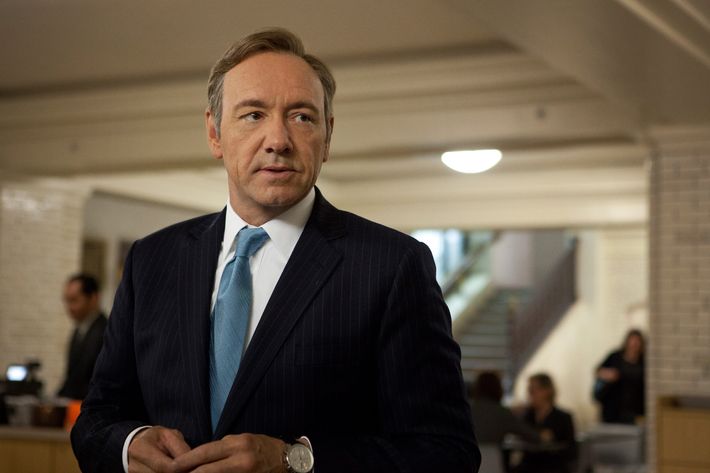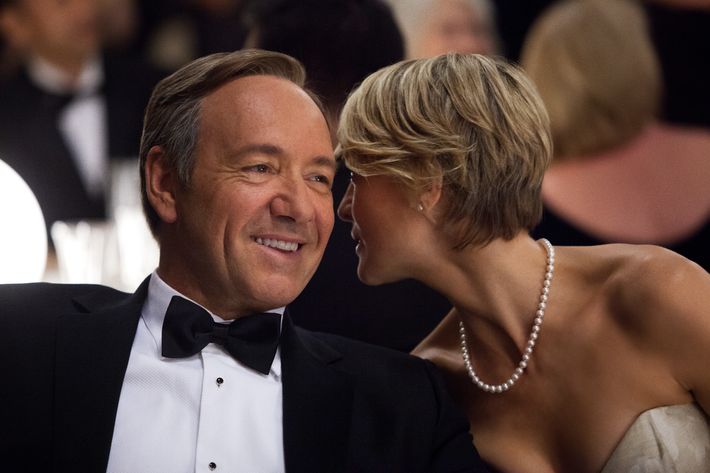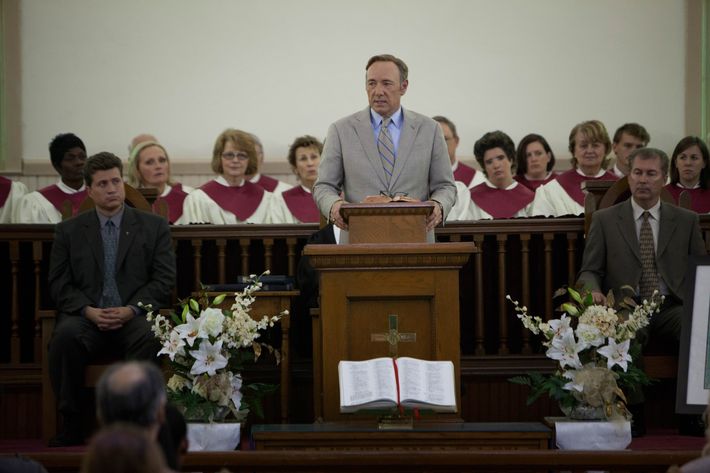
Turn off 40 percent of the lights in your apartment for that David Fincher effect, stick a flag pin in your lapel, and start talking directly to the camera: It’s time for House of Cards. Season two of the Netflix original series debuts on Friday — all episodes at once, just like the first time. Are you currently getting up to speed on season one and looking for someone to talk it out with? Well, all week, I’ll be recapping three episodes a day (four on Friday) for those of you who are new to HoC or just want to brush up before Valentine’s Day.
Quickly, a little about me. Currently, I recap Parks and Recreation and Pretty Little Liars for Vulture, and this week I’m taking a vacation from the fictional metropolises of Pawnee and Rosewood to write about a show that takes place where I really live — the District of Columbia. I have worked at the Washington Post (where I talked to HoC creator Beau Willimon about binge watching) but, other than age and height, I don’t have anything in common with Kate Mara’s Zoe Barnes. For instance, there are chairs in my apartment. (A note: I will demarcate each episode’s write-up by noting it in bold, so only venture as far as you’ve watched.)

Chapter 1
You can tell a lot about a character from his or her first three minutes onscreen. Don Draper starts Mad Men doing market research for Lucky Strike and swinging by his mistress’s apartment. In The Americans, Phillip and Elizabeth set a honey trap, chase down a target, and lose a comrade.
And in the opening scene of House of Cards, Francis Underwood murders a dog.
“There are two kinds of pain,” he tells us on his first break through the fourth wall. “The sort of pain that makes you strong, or useless pain. The sort of pain that’s only suffering. I have no patience for useless things.”
This will not be a show where Mr. Chips turns into Scarface. Frank Underwood was never Mr. Chips. He was vicious from the get-go, manipulative from the start; he was dotting is and crossing ts when the rest of his classmates were still learning the alphabet. I’ll bet he had a doll with no head on it. Willimon’s political message is clear: Abandon all hope, ye who enter here.
Frank’s appraisal of the scene at president-elect Garrett Walker’s election night bash is so high school: his tour of the room is, note-for-note, like the tour of the cafeteria Janis gives Cady in Mean Girls (and that Cher gives Tai in Clueless), and he tosses off that “Welcome to Washington” line like Luke’s “Welcome to the O.C., bitch.” Not that I would ever suggest our system of government in any way resembles the petty, juvenile, infight-laden land that is high school.
Beneath Frank’s tux is a shoulder with a mighty big chip on it. Frank says his time has come, but after 22 years in Congress it’s clear he feels his time is long overdue. So when POTUS-Elect screws over Frank, reneging on the promise to nominate him for secretary of State, Frank, the House Majority Whip, calls bullshit to Walker’s chief of staff: “The nature of promises, Linda, is that they remain immune to changing circumstances.”
Though Frank has already demonstrated his capacity for evil (see: dog murdering), I find him sympathetic here. Who among us doesn’t understand the feeling of being slighted, whether professionally or otherwise? Of being delivered bad news, not by the person who cut you loose, but by some middle-manager-as-messenger? No wonder he wants revenge.
Frank is married to the Princess Bride and their relationship is absolutely fascinating. For two people who are all about wearing masks for the outside world, they seem utterly naked with one another. Claire’s assertion that “We do things together. When you don’t involve me, we’re in free fall,” is one of the boldest claims of husband-wife teamwork I can remember seeing on TV in ages. The plots of so many shows rely on wives being kept in the dark, left to rage against infidelity or dishonesty in secret while their men see all the action alone. But Claire and Frank have a different deal going, and the show is stronger for it; she simply does not accept being on the sidelines.
Enter Zoe Barnes, a young reporter for the fake Washington Post, known here as the Washington Herald. She’s begging for an opinionated blog that she can write in the first person. Crotchety Old Legacy Journalism won’t have it! They are going to let the brilliance of Zoe Barnes slip through their arthritic fingers.
Congressman Peter Russo and his assistant, Christina, have phone sex on the job and say they love each other. This love does not seem to stop Pete from driving drunk with prostitutes. Frank bails Peter out in exchange for his “absolute, unquestioning loyalty.” But why bother? Who is Russo to Frank?
Power is Frank’s obsession. Like many an antihero before him, he cannot abide being weaker that anyone else in the room. He likes to collect people, so long as they can be made to do his bidding. This, I think, explains his secondary obsession with loyalty: to be owed loyalty is a kind of power, the power to influence and control another person. Frank’s version of being “owed” is more like indentured servitude: will Peter ever be done paying Frank back? Peter has already proven himself to be weak-willed—he cannot even fend off demons within; how could be possibly be expected to hold his own in battles with other people?—and Frank has an eye for weakness as sharp as a dog’s nose for fear. And demonstrating the ability to help another person is a kind of power. Only a powerful person can shake a criminal record like an Etch-a-Sketch and make a DUI disappear.
Time for a tour of Zoe’s apartment! Tiny spoiler alert: A recurring theme in House of Cards is anything involving young people will be furniture-free. Zoe has no desk. Or chair. Her books are on the floor. As written, Zoe is one of the weaker characters in this early stretch of HoC. Even the heightened reality that allows Kevin Spacey to wink at us through the screen and not seem too ridiculous doesn’t make Zoe’s sleazy dialogue (“Time is precious; powerful people don’t have the luxury of foreplay”) sound even remotely plausible. As for the notion of Zoe the overlooked gumshoe reporter, this is her promise to Frank: “I protect your identity, I’ll print everything you tell me, and I’ll never ask any questions.” I’m 100 percent sure that if you want to be a reporter, publishing everything a source says and never asking any questions is literally the exact opposite of what you should be doing. Maybe the reason the Herald never hooked Zoe up with a blog of her very own is because Zoe is terrible at her job.
Frank slips Zoe a copy of Donald’s “very far left of center” draft of the education bill, which Zoe wants to put online. (Every time someone at the Herald says anything related to the internet, it sounds like they’re putting it in air-quotes.) Her story makes the front page, but below the fold. A-minus, Zoe. A Herald staffer, staring at a screen that looks like a crashing computer, informs Zoe’s editors that “this web traffic is absolutely crazy.”
Zoe thinks she’s climbing up the ranks, but does she have any real power, or just the illusion of power that access and one good story provides? She thinks she’s in control, but she’s awfully quick to do everything Frank tells her to do. And I don’t think either one of them quite grasps what the other is capable of.

Chapter Two
Frank Jedi-mind-tricks Congressman Donald into taking the fall for the leaked education bill, and then he Jedi-mind-tricks Zoe into turning a non-story about would-be secretary of State Michael Kern into an A1 (or, in Zoe-speak, “homepage”) career-wrecker. Zoe doesn’t seem interested in Frank’s motives; does it really not occur to her that something nefarious is going on, or is she too high on that successful-scoop buzz to notice?
Frank sends Peter to talk to Crazy Roy, the man responsible for the wackadoo college-era op-ed Zoe leaked, and convince him to smear Kern’s good Boy Scout name. As your average public servant is wont to do, Peter brought some cocaine and booze along on his journey. Zoe gets to break the news that Cathy Durant will replace Kern, intel that Frank tells Zoe “will be true after you write it.”
On paper, almost everything about Frank reads as slimy and unlikable. But in Kevin Spacey’s hands, there’s this undeniable allure to him, that syrupy Southern accent softening the blow of even his most vicious lines. Spacey’s dialogue, as written by Willimon, wouldn’t be out of place onstage, but Spacey makes it feel right for the screen. (Mara seems to struggle with this — all her speeches sound rehearsed — but more on her later.) Frank’s self-assuredness, his way of always knowing the right thing to say, is appealing and almost comforting, even when he’s being wicked. You get that Olivia Pope “It’s handled” calm every time Frank shows up to start solving problems. I’m not sure that the straight-to-camera commentary would work with another actor, but here it feels right for Spacey, a theater guy at heart, to address us. It’s a way for Frank to acknowledge that he’s performing for an audience, and so much of politics is performance.
Doug, Frank’s creepy henchman, pays Peter’s Kristen Stewart doppelgänger call girl $10,000 for her “silence,” but then immediately asks her to open her mouth (gosh, those are confusing instructions) so he can pay her extra for some hookery. I know there’s a lot of competition for this position, but Doug is the worst. After having Evelyn fire 18 people from the Clear Water Initiative, Claire fires Evelyn. Doug is still the worst, though. For now.

Chapter Three
Oh boy, it’s the Peachoid episode. Seventeen-year-old Jessica Masters was texting her boyfriend “Doesn’t the Peachoid look like a giant — ” and then she lost control of her car. RIP. Frank hightails it back to Gaffney, his home district, to do damage control. Frank pulls a classic move, the “No, I couldn’t possibly read this prepared speech. I must speak FROM THE HEART.” He gets all Juliette Barnes (from Nashville, y’all) and shakes his fist at God. But then he’s like, “Twist! I love God. In the spirit of Zoe Barnes (no relation to Juliette, probably), I will ask no questions of my Lord.” It’s a crowd-pleaser. Crisis averted.
Zoe blows Frank a kiss on CNN to get his attention. Zoe’s boss is, inexplicably, not happy about his star reporter becoming a brand unto herself and promoting the paper through the power of self-promotion. “No TV for a month,” he decrees. Now go to your room!
For all the problematic, unrealistic aspects of Zoe’s story line, I like watching this power play among Zoe, her editor, and the highest brass at the Herald. Zoe’s boss is old-school and probably thinks Zoe should “pay her dues” by working an unglamorous beat at a tiny paper out in flyover country. I bet he takes it as a personal affront that Zoe’s managed to get to the Herald so quickly, that he’s sure she hasn’t earned it. But the ladder he climbed to get where he is doesn’t exist anymore. Either Tom knows that and resents it or he’s even more out of touch than I thought. I think he underestimates Zoe, not just her abilities but her ambition, her hunger, her scrappiness. Seems to be a common theme among the men in this show: They forget that the young women in their lives are sharper than they look.
Claire courts human germ factory/nonprofit founder Gillian to work at CWI. I want to root for Gillian, but she’s one of those annoying people who thinks “medicine doesn’t do much.” Do we trust that Claire admires Gillian? I do think Claire appreciates talent and vision, but I also think she operates by a keep-your-enemies-closer mentality. I worry for you, Gillian. Maybe see a doctor?
Christina has a magical job offer at the Speaker’s office with no deadline by which she must accept or reject. Peter plays the role of “supportive boyfriend” for approximately three hours before caving to his man-need to have his phone sex sweetheart just an office away. I can see in Christina’s Bambi eyes that she will be HoC’s The Girl Who Didn’t Go to Paris. Lean in, Christina!
Peter pours the last of his cocaine down the drain, thus ending his addiction woes forever and ever.
A few more things …
• I think Doug comes off as even scummier than Underwood. He’s a life ruiner with no discernible motive. Thoughts?
• Important celebrity sighting: Nate’s mom from Gossip Girl is Felicity Holburn! Good to see you again, Mrs. Archibald.
• If only we didn’t all rely on our cell phones to get us through awkward social situations, Francis Underwood may never have been photographed stealing a glimpse of Zoe Barnes’s G-string through her dress. IF ONLY. Maybe David Fincher’s secret message through cinema is that technology is the root of all evil.
• “She thinks I can be bought with a pair of tickets. What does she think I am, a whore in postwar Berlin?” For a show so heavy on the doom and gloom, House of Cards gets its laughs in.
• No idea what Claire’s graveyard deal is. Theories welcome.
• I worry that sometimes House of Cards has the Masters of Sex problem: an inability to let a theme speak for itself. That line by Zoe — “I’m better than what they have me doing” — would have been so much better if she hadn’t followed up with “You know what that feels like, don’t you? You would have made an excellent secretary of State.”
• Kevin Spacey is such a good dancer! So light on his feet.
• “Hey, Twitter-twat. WTF?” Why does Janine talk about Twitter like it’s a disease? She’s not that much older than Zoe.
• I wish Freddy’s BBQ Joint were real.
If you’ve binged ahead of the class, please keep those spoilers out of the comments. And when you’re caught up on the next batch, move on to my recap of Chapters 4–6.




